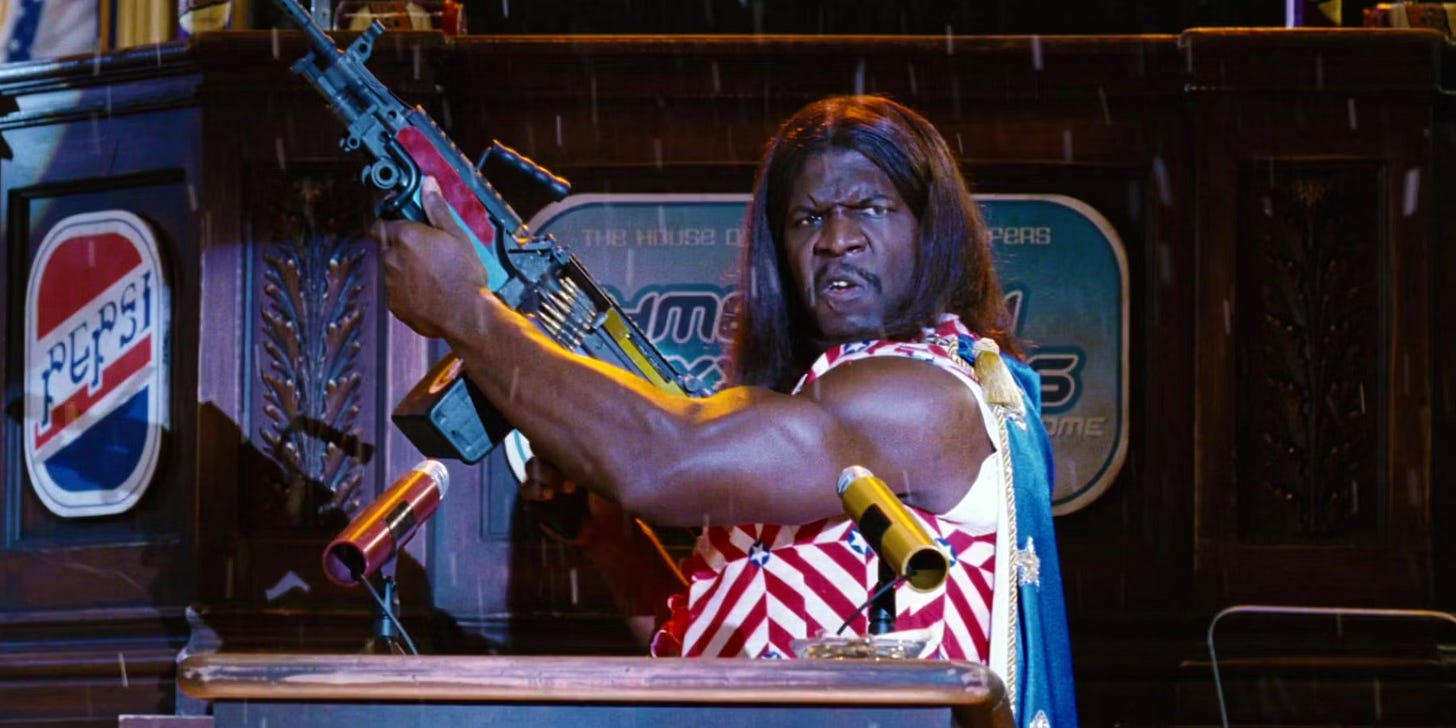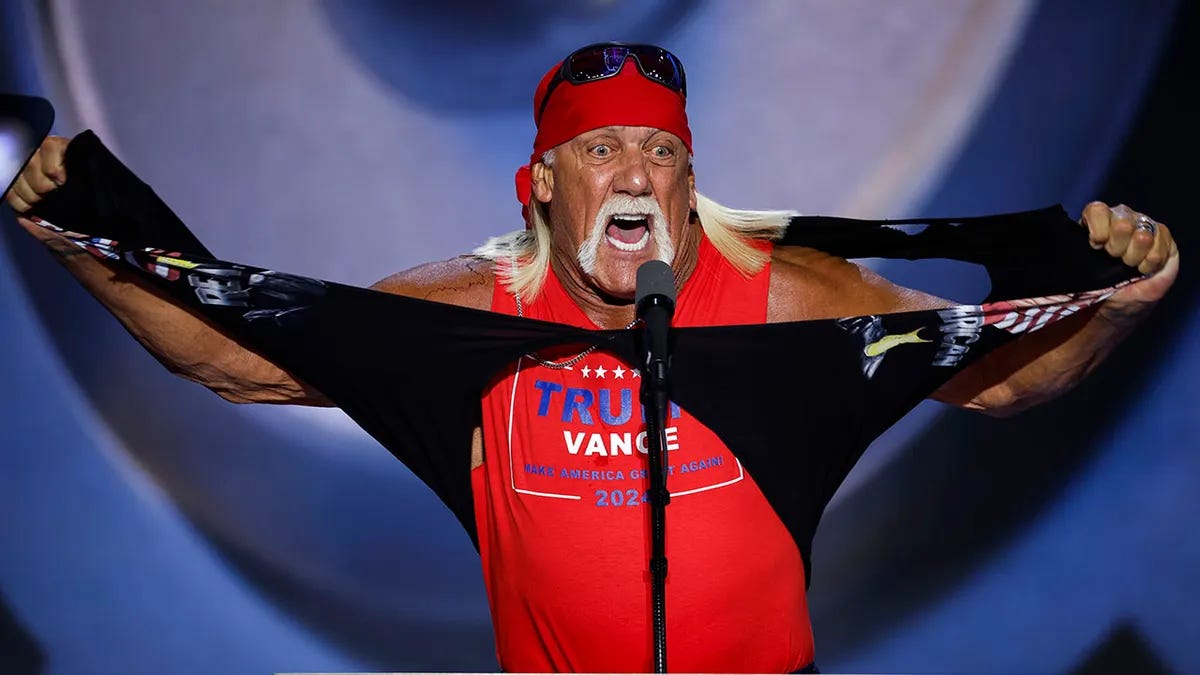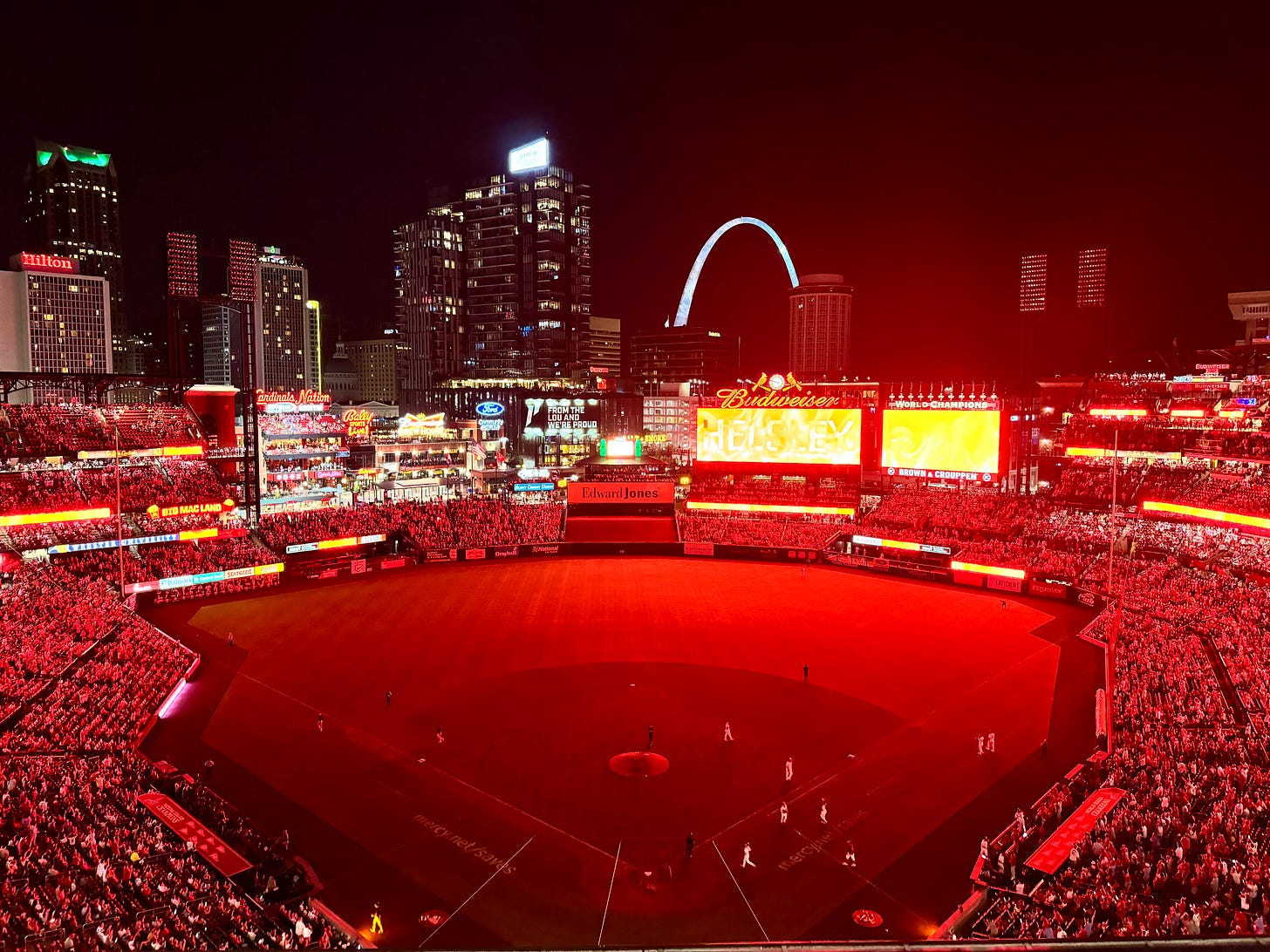Volume 5, Issue 29: Ice Cream
"You melted me on the floor, I almost died and cried for more."
Here is a button where you can subscribe to this newsletter now, if you have not previously done so. I do hope that you enjoy it.
So here is something I have been wanting to say out loud for a while and would now like to: I do not like professional wrestling, and I think it is bad for the world.
I did not grow up in a household that watched professional wrestling, and while I have many friends that I respect who did and who therefore have an appreciation for it that I do not, it should be noted that my children are not growing up in a household like that. If my kids are going to become professional wrestling fans, they are going to have to choose that on their own. I hope they don’t.
(I swear, I become a little bit more like Max von Sydow in this clip every day.)
In recent years, as people who grew up on Hulk Hogan, Stone Cold Steve Austin, The Rock, John Cena, Kurt Angle, so on, have reached professional age (and those figures have crossed over into the mainstream, culminating, inevitably, in Hogan tearing off his shirt at the Republican National Convention this week), talking about professional wrestling as if it is not serious, as if it’s culturally empty, as if it’s actively corrosive to society, has very much fallen out of favor. You’re supposed to be cool with professional wrestling now; you’re seen as a some sort of tweedy dork if you’re not. I mean, you can see Wrestlemania highlights on “SportsCenter” now; the wrestling marks have won. Part of this is because the power and ubiquity of professional wrestling, particularly the uniquely American totalitarian dominance of WWE and Vince McMahon, has become more apparent and understood, even mainstreamed. The best example of this is Abraham Josephine Riesman’s terrific McMahon biography Ringmaster, which makes a depressively persuasive case that America has essentially become an extended WWE storyline. Riesman, a fan of wrestling but also a wise enough writer to see the dangers it poses both to its athletes and its followers, argued convincingly that the WWE, and professional wrestling, has pervaded culture in a way that its traditions have become standard operating procedure for how many Americans view the world, and navigate it. This is true. I think it’s sort of undeniable.
But I also think that part of it is, well, if I may be frank, that we have collectively sort of given up. There was a time that the famous scene in the 2006 movie Idiocracy—which has gained relevance in recent years for obvious reasons but, it should be noted, is not actually a very good movie; Maya Rudolph will never have a worse role in her life, and thank goodness for that—in which President Dwayne Elizondo Mountain Dew Camacho addresses Congress played like a ridiculous over-the-top satire. The problem is not that now it feels vividly real but, instead, rather than being appalled by it, we all just shrug and accept that fact as a weird, slightly scary but mostly amusing byproduct of the world we now live in.
But I do not think it makes one a snobby pencil-necked egghead elitist to wonder if maybe the seeping of professional wrestling discourse into thorny, complex, real-world matters that require thoughtfulness, subtlety and empathy—to discuss issues that are legitimately difficult to solve—is not a positive step forward for society. I think that maybe it is in fact bad.
This is not to say that wrestling itself is a vacant activity or those who take part of in it are not talented athletes and performers. I had a brief year or so that I watched wrestling, back in the early aughts, when we had just started The Black Table, a site that is so old now that the quickest and easiest way to explain to people what it was is just to ask an AI bot. My friend and fellow editor Eric Gillin was a huge wrestling fan, and our “office” was his apartment, so wrestling was always on the television. I found myself initially fascinated by the push-pull between what was “real” and what was “staged,” the notion that you could be a “smart” fan who followed all the behind-the-scenes meta-storylines or you could just watch dudes (and woman, but mostly dudes, at least back then) in tights bounce other dudes in tights off of tables and chairs. I actually attended Wrestlemania 20 at Madison Square Garden with Gillin, a terrific wrestling explainer, and I found myself awed by the physicality of the athletes, their ability to execute complicated and dangerous choreography live in front of millions of people. There was a seductive simplicity to the production as well: The show, quite skillfully, telegraphed to you when to be happy, when to be angry, when to scream, when to cheer, when to lose your ever-loving mind. There was comfort in that, to be so happily manipulated and maneuvered—to just let go. That Wrestlemania featured a main event that was commonly considered one of the greatest wrestling matches of all time … until four years later, when the man who won it, Chris Benoit, murdered his wife and son and then killed himself.
I admire the athleticism and showmanship, and it should be noted that there have been two great movies made about professional wrestling. (The Wrestler and The Iron Claw.) Not long after I went to that show, though, I stopped watching. It was partly because my career finally got going and I had a lot less free time to just hang out over at Eric’s on Wednesday nights. But mostly it was because I began, quickly, to find wrestling pretty boring. The storylines began to repeat themselves, which is normal for any TV show, but the larger issue, for me, is that it became increasingly clear the whole enterprise was built on an inherent foundation of cynicism among its audience, particularly its so-called “smart” fans. What people who don’t watch wrestling often don’t understand is that everyone who does watch it knows—and, really, has always known—that its results are not “real,” that the outcome of matches is scripted, that all of this is, to use the terminology, “kayfabe.” This awareness allows the average viewer to enjoy what they are watching twice: Once during the actual performance, and once more when they get to reflect on how “smart” they are for understanding what’s really going on. There is a certain conspiratorial, we’re-the-only-ones-that-really-get-it aspect to it: You get to laugh and you get to be in on the joke.
But this increasingly struck me as an incredibly empty way to enjoy anything. When you are watching something in large part to figure out exactly how the fix is in, you remove any emotional investment from the experience. Everything becomes about an “angle,” or working a crowd, or—and this is why I’d argue wrestling has become even more popular in an Internet age—turning everything into a blaring, preening circus as a way to promote yourself, doing anything impossible to generate “cheap heat,” at any cost. The best way to win at wrestling was not to be the best athlete, or the best at anything; it was to be the best self-promoter. It turned everything into a contest about nothing but yourself.
And when you realize that’s the only goal of a “competition,” you end up not believing in much of anything.
Which, I might argue, is the sort of thinking that got us here:
In the book Fault Lines, authors and historians Kevin Kruse and Julian Zelizer write about Lee Atwater, the infamous Republican political consultant whose strategies and techniques were so sinister and gleefully underhanded that, in his final days, as he lay dying of cancer at the age of 40, he apologized to the entire world for what he had unleashed.
As Kruse and Zelizer note, the genesis of Atwater’s particular genius was based in his deep love of wrestling. They write:
Famously, [Atwater] had long been a fan of professional wrestling, which he insisted was the only “honest sport” there was, because everyone involved – the producers, the performers, the announcers and the audience – all knew it was entirely scripted and thoroughly fake. The world of politics, in contrast, may have seemed wholesome on the surface but, behind the scenes, was full of cheaters. “He was basically saying that politics is phony, the government is phony, that a lot of personal life is phony,” reporter Howard Fineman recalled. “And ‘phony’ was a big word with him.”
While Atwater respected wrestling for its honest dishonesties, he also learned a great deal about stagecraft and storytelling from the sport. As his biographer later noted, wrestling shows were “where he learned bombast, and how to immobilize a larger opponent.” In the 1988 campaign, he took those lessons to heart, presenting his candidate to voters as the crusading hero and his opponent as the untrustworthy heel.
It’s that “only honest sport” thing that drives me nuts, as if actively lying is the only way to be truly honest—something I profoundly reject. Deep down, that’s my problem with professional wrestling. It encourages the idea somehow wrestling’s inherent artificiality makes it more honest; that, as Atwater put it, “politics is phony, the government is phony, that a lot of personal life is phony.” I can’t think of anything more inherently cynical than that. Everything is staged. The world is a joke. Caring about something sincerely is stupid. Being fundamentally dishonest is the only honest way to be. Believing that the world has meaning is pointless and counterproductive. All that matters is winning.
These are increasingly mainstream ideas in American culture, in ways that should be existentially disturbing who cares about what sort of place we’re going to be leaving for our kids and their kids. I look around our world, and I see wrestling everywhere. That’s good for those who want to justify their childhood fandoms. But I’m pretty sure it’s terrible for the rest of us.
Here is a numerical breakdown of all the things I wrote this week, in order of what I believe to be their quality.
The Copa America Ticket Fiasco Bodes Poorly Everywhere, New York. Collapses everywhere.
Scarlett Johansson Movies, Ranked, Vulture. Updated with Fly Me to the Moon.
Woody Harrelson Movies, Ranked, Vulture. Updated with Fly Me to the Moon.
This Week’s Five Fascinations, MLB.com. This one had a rare theme, which focuses on five teams for which the next 10 days are particularly critical.
This Week’s Power Rankings, MLB.com. This one also had a theme.
PODCASTS
Grierson & Leitch, no show this week, but check out our best movies of the first half of the year.
Seeing Red, Bernie and I took stock of the Cardinals at the All-Star Break.
Morning Lineup, I did Friday’s show this week, the most recent one. I will usually be doing Friday morning’s show, but I’m doing three shows this coming week, so this is a good time to subscribe, you’ll like it.
LONG STORY YOU SHOULD READ THIS MORNING … OF THE WEEK
“American Berserk,” Ross Barkan, Political Currents. I thought this Ross Barkan paragraph about Trump was so good that I hope he won’t mind if I just quote the whole thing here:
Trump is a criminal, a pathological liar, a narcissist, and an inveterate bully. He has few deeply held beliefs. As a politician, he has no regard for the mechanics of government or the analysis of policy. He is, as his critics say, vacant. And he is also a genius—not in the sense of a soaring I.Q. or an aptitude for the sciences or any ability to make computations that most human brains cannot. He is, in no way, an intellect. His genius is for the all-American, for publicity, for having the native foresight, buried deep in his viscous core, to understand what he had to do. He had to perform. He had to shout fight, he had to hunt out the cameras, he had to get his first in the air, he had to apprehend, somehow, what this all meant before the secret service barreled him away. He himself, in the hospital, seemed astounded by his own power. “A lot of people say it’s the most iconic photo they’ve ever seen,” he told Michael Goodwin, the sycophantic New York Post columnist. “They’re right and I didn’t die. Usually you have to die to have an iconic picture.” This is the platonic ideal of a Trump quote: self-aggrandizing, incorrect, and aimed straight, like an arrow into the heart, at all that he will ever care about, and all he has gained. He is known. He is forever known. He has fame, and the best kind, the American kind, that which, like Cronos, devours whatever else is on this Earth, so men and women in Paris and Egypt and Kampala can think of him and dream of him and even bear his likeness, this image of the blood and the flag and the fist, on a cotton t-shirt. What else, near death, can Trump long for? The presidency is beside the point. If he wins, as everyone seems to think he will, he’ll only get four more years anyway, no matter what they tell you about American Hitler. Trump has no genius for governing or genuinely dominating others; he cannot, like Napoleon, stand up a new empire or, like the Nazis or the Soviets, make fascism as real as the gun pressed to your temple. His political machine runs on the exhaust fumes of his own mania, and it can do little to discipline the states, the little republics of federalism that will choose, if governed by Democrats, to shirk Trumpism. Soon, Trump will be eighty, and this milestone will either be celebrated in the Oval Office or at Mar-a-Lago, in permanent exile as a two-time presidential loser.
Also, check out this great David Weigel piece about Trump’s otherworldly run of good luck. Too: Damon Linker on the absurdity of Trump’s resilience. And, last one, this Jonathan V. Last argument as to what would be Kamala Harris’ strongest pitch.
Speaking of excellent pitches, how about this, and this.
ONGOING LETTER-WRITING PROJECT!
This is your reminder that if you write me a letter and put it in the mail, I will respond to it with a letter of my own, and send that letter right to you! It really happens! Hundreds of satisfied customers! (I’m sorry I’m so behind on these. But I am starting to catch up!)
Write me at:
Will Leitch
P.O. Box 48
Athens GA 30603
CURRENTLY LISTENING TO
“Mass Romantic,” The New Pornographers. They’re playing in Athens in a couple of months, very underappreciated, these folks.
Remember to listen to The Official Will Leitch Newsletter Spotify Playlist, featuring every song ever mentioned in this section.
Also, now there is an Official The Time Has Come Spotify Playlist.
William and I saw the Cardinals sweep a doubleheader in St. Louis last Saturday, and we'll be in Smyrna today to see them try to sweep another one.
And hey, we’ve got a flight home.
Have a great weekend, everyone. I’m feeling a little more hopeful this week. I hope you are too.
Best,
Will









I couldn’t agree more ! Professional Wrestling has always felt very wrong since its inception for a multitude of reasons .
I loved professional wrestling unabashedly -- when I was 10. I briefly liked it in an "ironic" way during college. And then I grew up. You're right that the number of adult men who genuinely love wrestling (and the fact that the likely next president is in the wrestling hall of fame) is worrisome.
Funny, the appearance of Hulk Hogan in prime time on the final night of the RNC rattled me so much that I felt like I had to write about it, too, for slightly different reasons. Here's a link in case anybody's interested:
https://medium.com/rome-magazine/donald-trump-the-hulkster-and-me-9e1d5c04d86e?sk=13f43330aa2a8a0688fb73eeca6eb570